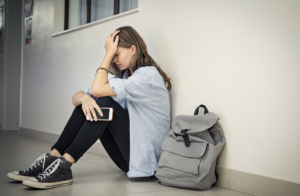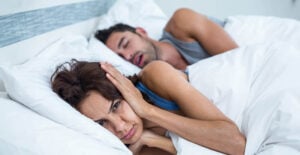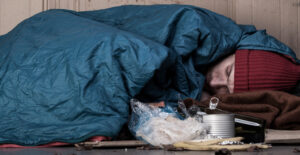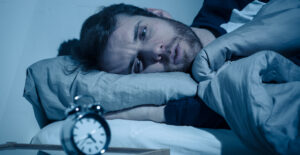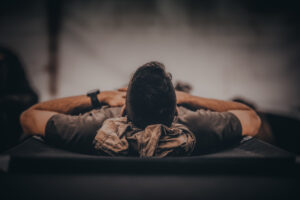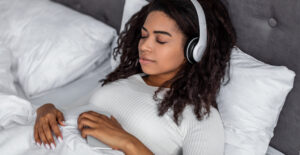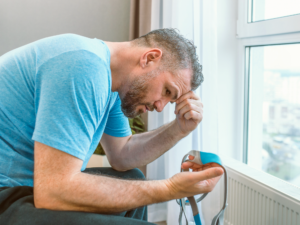Lifting Weights May Help You Sleep Better Than Cardio
It’s no secret that exercise can improve your sleep.
We know that aerobic exercise can help you fall asleep faster and stay asleep longer. Miles on a treadmill or an hour on the spin bike may lead to a fantastic night’s sleep.
Although that heart-pumping cardio is great for your health, it’s only one piece of the workout puzzle. The U.S. Department of Health and Human Services Physical Activity Guidelines for Americans say you should also include at least two days of strength training in your routine. According to new research presented in March 2022 at an American Heart Association (AHA) conference, this resistance training may help improve your sleep as much as cardio. And it might be even better.
Angelique G. Brellenthin, an assistant professor at Iowa State University and the study’s co-author, told the AHA that the study is “one of the largest and longest exercise trials in a general adult population to directly compare the effects of different types of exercise” on sleep. The preliminary research found that individuals who regularly completed resistance training slept better and longer than those who took part in cardio exercise.
What does that mean for your sleep and your exercise routine? Here’s a look at the study and how it might demystify the connection between exercise and sleep.

The Link Between Strength and Sleep
The study isn’t the first to examine exercise’s effects on sleep and insomnia. In 2017, for example, researchers looked at 34 studies on the topic, with 29 of the studies confirming that exercise improves sleep quality or duration — that is, how well you sleep and how long you sleep.
Exercise also can help stabilize your mood and decompress the mind. Dr. Charlene Gamaldo, medical director at Johns Hopkins Center for Sleep, calls this “a cognitive process that is important for naturally transitioning to sleep” in a Johns Hopkins article .
What kind of exercise helps sleep the most? It has still been a bit of an unknown, Brellenthin said to SleepFoundation.org. That’s where the latest study comes in: The “ 2018 Physical Activity Guidelines Advisory Committee Scientific Report ” identified an “explicit need for more rigorous investigations into resistance exercise and sleep outcomes,” she says.
The 2022 study included more than 400 overweight or obese adults who were not physically active. They were divided into four groups. Each group exercised in a specific way in the study time frame:
- Aerobic, or cardio, exercise
- Resistance, or strength, training
- A combination of the two
- No exercise at all
Participants in the exercise groups completed 60 minutes of physical activity three times a week.
Over the course of a year, the participants who did muscle-building exercises slept an average of 17 minutes longer than those in all other groups. Additionally, sleep efficiency — the total amount of time you spend asleep when you’re in bed — increased for those doing resistance training or a combination of resistance and aerobic exercise. It did not increase for those in the cardio exercise group or those who did not exercise.
The impact on people who exercise already or who are not overweight is uncertain, Brellerthin says. Results were most significant in people who had sleep problems when the study started, however.
Over the course of a year, the participants who did muscle-building exercises slept an average of 17 minutes longer than those in all other groups
“I think it’s reasonable to assume that anyone with sleep complaints, regardless of their weight, might see a benefit from performing resistance exercise,” Brellenthin says.

How to Add Resistance Exercise to Your Sleep Routine
Sleeping better through exercise is not a matter of choosing one routine over another, Brellenthin says.
“All types of exercise are generally beneficial for sleep,” she says. “But resistance exercise may provide slightly superior benefits, which may be of interest to those who are particularly concerned about their sleep.
“Overall, though, this study is a reminder that aerobic and resistance exercises provide unique and often complementary benefits. So it’s important to get a little bit of both in your weekly routine.”
How should you do it? You don’t have to double your exercise time if you’re adding muscle-building sessions to your regular cardio activity. Research shows that a few weekly sessions of less than an hour of resistance exercise can hit the spot, Brellenthin says.
“All types of exercise are generally beneficial for sleep. But resistance exercise may provide slightly superior benefits.” — Angelique G. Brellenthin, Iowa State University
In the resistance training study, participants worked all their major muscle groups — the chest, shoulders, back, arms, abs, and legs — using various resistance machines. If you don’t have access to strength-training machines, there are plenty of other ways to build strength. You could invest in a set of dumbbells or resistance bands for at-home use.
Even if that is not an option, there are plenty of resistance exercises that use just your body weight, such as:
- Pushups
- Squats
- Lunges
- Crunches
- Planks
- Chair dips
High-intensity interval training (HIIT) also can benefit your sleep. A review of 41 research studies found that HIIT workouts significantly improve sleep quality. High-intensity exercises also have a smaller — but still noticeable — effect on sleep efficiency.
When Should You Exercise to Get a Good Night’s Sleep?
Of course, you don’t want your exercise routine — whether aerobic, resistance, or both — to hurt your sleep. To make sure of that, avoid working out too close to bedtime, says Max Glaser, a strength and conditioning coach for professional athletes.
“Before you fall asleep, you need your heart rate to drop, and you need to return to homeostasis,” says Glaser, who has a master’s degree in exercise physiology. “Homeostasis” refers to your body’s state of “normal,” with a normal heart rate, body temperature, breathing rate, and so on.
If you exercise too close to bedtime, “as you crawl into bed and try to sleep, your body is still trying to drop your heart rate and return to a normal baseline,” Glaser says. This could prevent falling and staying asleep.
Incorporating resistance training into your weekly exercise routine has the same basic requirements as any other type of exercise: motivation and willpower.
“Beginning and maintaining a resistance-training routine comes down to availability and consistency,” Glaser says. “Make it as easy as possible to succeed. … Schedule it on your calendar. Don’t skip it.”
References
7 Sources
-
U.S. Department of Health and Human Services. (2018). Physical Activity Guidelines for Americans (2nd edition).
https://health.gov/sites/default/files/2019-09/Physical_Activity_Guidelines_2nd_edition.pdf -
Brellenthin, A. G., & Lee, D. C. (2022). Abstract 038: Comparative Effects Of Aerobic, Resistance, And Combined Exercise On Sleep. Circulation, 145(Suppl_1).
https://www.abstractsonline.com/pp8/?_ga=2.43661667.795188704.1646150369-78844285.1609356599#!/10553/presentation/99 -
American Heart Association News. Resistance exercise may improve sleep more than aerobic exercise. (March 3, 2022), Retrieved April 19, 2022.
https://www.heart.org/en/news/2022/03/03/resistance-exercise-may-improve-sleep-more-than-aerobic-exercise -
Dolezal, B. A., Neufeld, E. V., Boland, D. M., Martin, J. L., & Cooper, C. B. (2017). Interrelationship between sleep and exercise: A systematic review. Advances in Preventive Medicine, 2017, 1364387.
https://pubmed.ncbi.nlm.nih.gov/28458924/ -
Johns Hopkins Medicine Health and Wellness. Exercising for Better Sleep., Retrieved April 19, 2022.
https://www.hopkinsmedicine.org/health/wellness-and-prevention/exercising-for-better-sleep -
The 2018 Physical Activity Guidelines Advisory Committee Scientific Report to the Secretary of Health and Human Services. (February 2018)., Retrieved April 13, 2022
https://health.gov/our-work/nutrition-physical-activity/physical-activity-guidelines/current-guidelines/scientific-report -
Min, L., Wang, D., You, Y., Fu, Y., & Ma, X. (2021). Effects of High-Intensity Interval Training on Sleep: A Systematic Review and Meta-Analysis. International Journal of Environmental Research and Public Health, 18(20), 10973.
https://www.ncbi.nlm.nih.gov/pmc/articles/PMC8535574/


